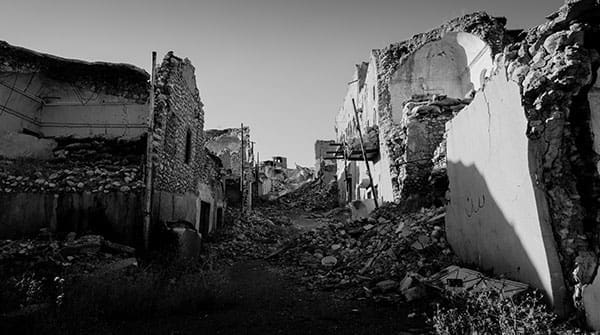As a half-German, half-Arab educator, I struggle to make sense of the conflict in the Middle East
 Concepts like international humanitarian law, crimes against humanity, and genocide can be very academic. However, they are central to my career as I teach my students these ideas as words from a textbook. Too often, I forget their more profound meanings.
Concepts like international humanitarian law, crimes against humanity, and genocide can be very academic. However, they are central to my career as I teach my students these ideas as words from a textbook. Too often, I forget their more profound meanings.
The current situation in Israel and Palestine has forced me to experience these uncomfortable realities on a visceral level. I am half German, and I deeply regret the unfathomable pain my mother’s country caused to European Jews and others whom the Nazis found undesirable. I am determined to build a world where this can never happen again, knowing that it will take generations for humanity to come to the level of consciousness that this requires.
I am also Arab, and I carry a name that has been anglicized for over 100 years. I am fascinated by the world where diverse peoples lived for thousands of years in a manner that, as historian Ussama Makdisi states, was “separate, unequal, and protected”. This is the land of Abraham, where a young Palestinian Jew challenged the status quo and laid a foundation for two more great religions.
 Photo by Levi Meir Clancy |
| Related Stories |
| Calls grow for humanitarian corridor to reach Gaza
|
| The rise and rise of Daesh
|
| Canada must designate Iran’s Revolutionary Guard a terrorist group
|
I am confused by what I see happening in the Middle East today. Why do Israeli settlers chant, “Death to Arabs!”? Why do they hate me? Are we not one people?
I am sickened by the recent indiscriminate attacks by Hamas fighters on innocent Israeli civilians, even children. How could they kill and kidnap these beautiful people, many of whom have devoted their lives to healing the hostilities of the last century and bringing the Children of Abraham back together?
Surely, there will be a call for the enforcement of international humanitarian law to address the crimes against humanity committed by Hamas. Surely, there will be an investigation of the Israeli military to determine the reasons for the colossal failure of this highly advanced force to protect their citizens from an organized crime syndicate. Surely, the monsters behind this heinous attack will be brought to justice. The global community has put the structures in place to do so. All of this is written in my textbooks.
I am horrified by the response. Rather than appealing to international law, I am told by Yoav Gallant, the Israeli Defense Minister, that Arabs like me are “human animals”. I watch pro-Israel protestors in New York proclaiming to an interviewer that they want to see Gaza, a densely populated region home to 2.4 million Palestinians, half of whom are children, completely wiped out. I also hear the leaders of powerful countries promising to give the Israeli military the weapons they need to carry out this task.
I see myself and my children in the people struggling to stay alive in Gaza. When a child is born, a father knows that his most profound calling in life is to love and protect the precious human being that lies in his arms. I feel the agony of a man running into a crowded and understaffed hospital holding a bloodied child in his arms, and I see the beautiful eyes of my daughter as an infant looking back at me, knowing that I have failed in my most sacred mission in life, to keep her safe and protected.
I wipe away the tears and return to my keyboard in my safe, comfortable living room. I must speak for this father because this man is me. If I have the courage to do so, I can feel some of his pain, even though I am on the other side of the globe and removed from the Arab world by three generations. There is something profoundly human in our connection.
How can we fail so terribly as a world and not see the humanity in our neighbours? Why don’t we understand the unnecessary pain we are causing one another? What is wrong with us?
Gerry Chidiac specializes in languages, genocide studies and works with at-risk students. He is the recipient of an award from the Vancouver Holocaust Education Centre for excellence in teaching about the Holocaust.
For interview requests, click here.
The opinions expressed by our columnists and contributors are theirs alone and do not inherently or expressly reflect the views of our publication.
© Troy Media
Troy Media is an editorial content provider to media outlets and its own hosted community news outlets across Canada.

